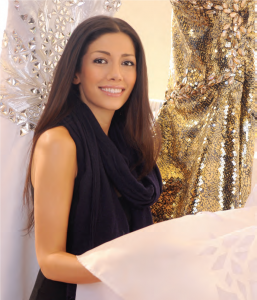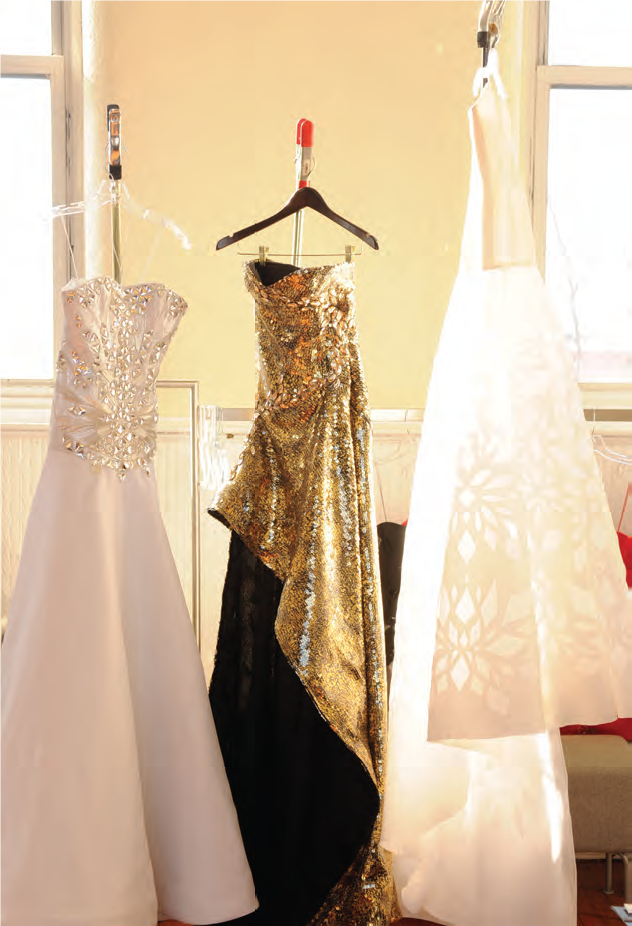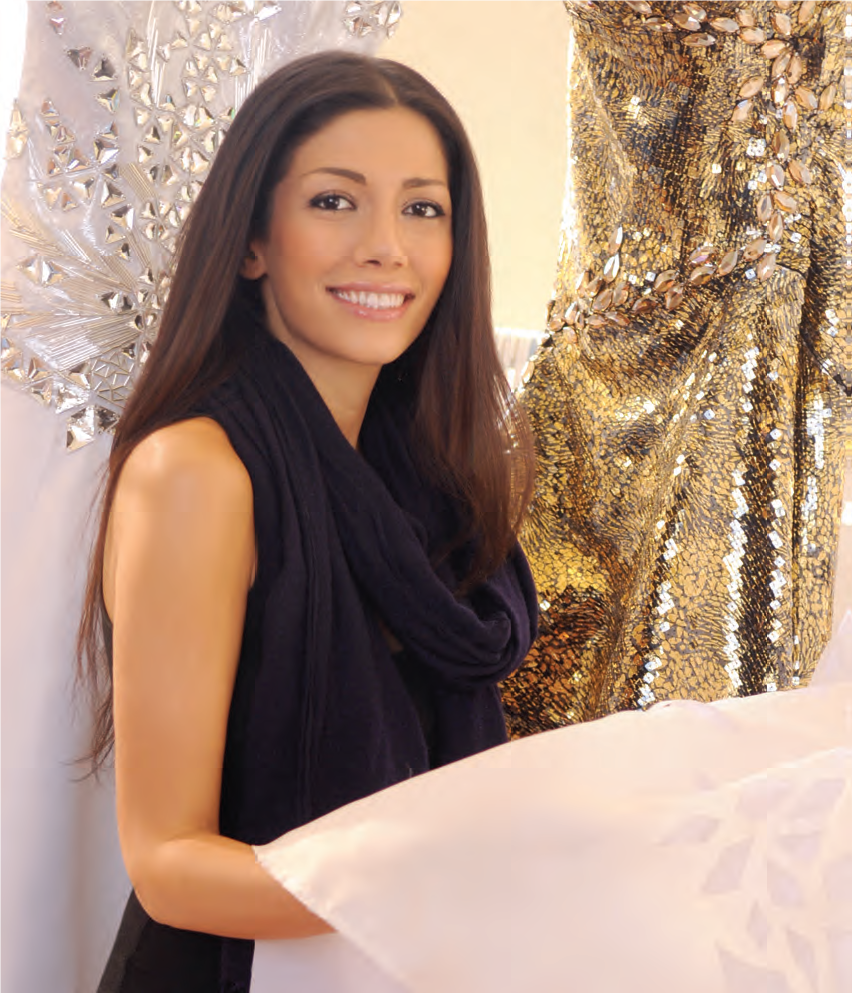 The power of television in our society has been made painfully clear by the current Reality TV craze. With careful editing and decent ratings, it seems any half-wit can become a major media star. Yet for all of the bad things this genre says about us as a culture, it can also do a lot of good. Exhibit A is IRINA SHABAYEVA, an outrageous young talent who rose above the competition to win Project Runway. For all its contrivances, the program transformed an industry unknown into New York’s newest designing woman—a career-launch that might never have happened but for the magic of basic cable. EDGE Style Editor Dan Brickley has been there and done that. The former host of TLC’s A Makeover Story is now a regular in US Weekly and runs a successful pop-culture web site. Dan caught up with Irina while she was putting the finishing touches on her new Fire & Ice collection (see pages 55-62), due to debut at Fashion Week in February. As he discovered, the first thing you need to know about Irina is that she was born in Georgia…and raised in Brooklyn.
The power of television in our society has been made painfully clear by the current Reality TV craze. With careful editing and decent ratings, it seems any half-wit can become a major media star. Yet for all of the bad things this genre says about us as a culture, it can also do a lot of good. Exhibit A is IRINA SHABAYEVA, an outrageous young talent who rose above the competition to win Project Runway. For all its contrivances, the program transformed an industry unknown into New York’s newest designing woman—a career-launch that might never have happened but for the magic of basic cable. EDGE Style Editor Dan Brickley has been there and done that. The former host of TLC’s A Makeover Story is now a regular in US Weekly and runs a successful pop-culture web site. Dan caught up with Irina while she was putting the finishing touches on her new Fire & Ice collection (see pages 55-62), due to debut at Fashion Week in February. As he discovered, the first thing you need to know about Irina is that she was born in Georgia…and raised in Brooklyn.
EDGE: Georgia? I’m not hearing that.
IS: The Republic of Georgia—not USA Georgia. From grade one to four, I was in Georgia. Then my parents moved to the States and I finished my education in Brooklyn.
EDGE: How is that fusion of cultures reflected in your personality?
IS: Europeans in general are straightforward, want to offend anyone. I think there’s a way to be both, to be polite and honest. EDGE: Did this help you on Project Runway? IS: I think it did. EDGE: What goes through your head when you stand in front of the judges…and a couple of million viewers? IS: You’re nervous because of the lights and the cameras, and the whole situation makes your heart race. But I wasn’t really afraid of what the judges had to say because, chances are, whatever they found—good or bad—I already knew. Most creative people can look at their work and, if it’s not that great, call themselves out on it and just say, “Hey, you know what? Maybe this is a flop.” Everyone has had a day where nothing seems to come together. Unfortunately, on Project Runway the whole world knows about it because the judges make sure that you hear it over and over again. EDGE: Did the judges ever have a bad day? IS: Everyone had their days. EDGE: When you live, work and—most importantly— compete with other designers 24 hours a day, it can bring out the worst in someone. Yet you managed to stay above the fray. IS: Project Runway was a big deal, so I decided that if I was going to do it, I was really going to focus. I knew that some people would be really friendly and others would reach their boiling points quickly. The competition never stops. When we were off camera, we were still interacting, so someone could say something that would trigger a reaction the next day when the cameras were rolling again. In order to avoid getting swept up in the drama, I just stayed focused on doing what I was there to do—which was to meet a challenge every day. EDGE: One of your fellow contestants said that you weren’t there to make friends. Naturally, that’s the reputation you got as a “character” on the show. Fair or unfair? honest people. They call it like it is. American culture is a lot more sugar-coated. People are afraid to be honest sometimes because they don’t want to offend anyone. I think there’s a way to be both, to be polite and honest.
EDGE: Did this help you on Project Runway?
IS: I think it did.
EDGE: What goes through your head when you stand in front of the judges…and a couple of million viewers?
IS: You’re nervous because of the lights and the cameras, and the whole situation makes your heart race. But I wasn’t really afraid of what the judges had to say because, chances are, whatever they found—good or bad—I already knew. Most creative people can look at their work and, if it’s not that great, call themselves out on it and just say, “Hey, you know what? Maybe this is a flop.” Everyone has had a day where nothing seems to come together. Unfortunately, on Project Runway the whole world knows about it because the judges make sure that you hear it over and over again.
EDGE: Did the judges ever have a bad day?
IS: Everyone had their days.
EDGE: When you live, work and—most importantly— compete with other designers 24 hours a day, it can bring out the worst in someone. Yet you managed to stay above the fray.
IS: Project Runway was a big deal, so I decided that if I was going to do it, I was really going to focus. I knew that some people would be really friendly and others would reach their boiling points quickly. The competition never stops. When we were off camera, we were still interacting, so someone could say something that would trigger a reaction the next day when the cameras were rolling again. In order to avoid getting swept up in the drama, I just stayed focused on doing what I was there to do—which was to meet a challenge every day.
EDGE: One of your fellow contestants said that you weren’t there to make friends. Naturally, that’s the reputation you got as a “character” on the show. Fair or unfair?
IS: It bothered me that it was taken to an extreme. It wasn’t like I said, “I hate everyone!” It was more like, if I made friends, well, that was a bonus. I mean, why wouldn’t you want to make a friend or two? But I wasn’t there to socialize. It wasn’t cocktail hour. I wanted to win that thing.
EDGE: Is it true you hadn’t watched previous seasons of Project Runway?
IS: I never watched any season in its entirety. I watched it randomly, like I’d go over to someone’s house and they’d be watching it.
EDGE: And what was your impression? What made you think it was worth a shot?
IS: I thought it was great. I mean, I knew there was a downside to Reality TV, but I felt that if there was something positive that comes out of a show like this, then maybe it’s worth doing. Tim Gunn was a judge, and that gave me a comfort level because he taught me at Parsons. That was disclosed to everyone, by the way—it wasn’t like we had a secret friendship. But I thought if Tim was part of the show, he’s so respectable and honest, I knew the judging had to be fair.
EDGE: What was the casting process like?
IS: It was a challenge. I understood that they pick people for their work but also for their personality. A lot of talented and creative people tend to be introverted. I tend to be laidback, and I can’t be someone that I’m not, but luckily they felt my personality was a good fit.
EDGE: That first day, when you were surrounded by all the lights and cameras and producers, did you think, “Oh my God! I’ve got to look good, too!”
IS: That first day, Dan? I did. But soon I was like, “Who cares? I’m here to win this thing!” I wasn’t going to look glamorous—it was too exhausting. My sister would watch and say, “Why are you wearing that grandma outfit? Why are you wearing that headband?” And I’d be like, “Because my hair is gross! I haven’t washed it in days!” In retrospect, they could have given us more time to get ourselves together, but I think they wanted us looking as tired and worn out as possible because then viewers sympathize with you. And people should have sympathized with us. We were beyond exhausted. There were days when I was thought, “Do I really have to move now? I don’t think my body can.” Ultimately, it was fun—in a weird, distorted way.
EDGE: When did you think you actually had a shot at winning Project Runway?
IS: A little more than half way into the competition. I was standing on the runway and it was my turn to go when one of the lights blew out. They brought out this three-story ladder to replace the light, which took an hour. I had that hour to just stand there and think. And it came to me. “I could really win this thing…and I think I am winning. I’m so winning this thing!”
EDGE: After you won, was there a clock ticking in your head? Did you think, “I’ve got to capitalize on this notoriety and strike while the iron is hot?” IS: I didn’t assume anything. As you know, Dan, the fashion industry is funny. People in the business like the show. They think it’s great. But it doesn’t validate you in their eyes. What validates you is your work. So I didn’t feel I had this celebrity glow that would take me places. Yes, it’s great to have fans and a recognizable name, but remember, those fans aren’t necessarily your consumers. Building a business—a real, successful business—is very different than winning Project Runway.
EDGE: So what’s it going to be for Irina Shabayeva? Custom order? Big label? Big backing?
IS: Well, I launched an evening line last season, as well as a bridal collection, and it’s been great. I’m at Kleinfeld Bridal and I’m in great company—Monique Lhuillier and Oscar De La Renta—so I’m going to stick with doing the bridal and evening custom order. In terms of my Ready To Wear, I want to build it up and become a brand because it has a place in the market. I’ve gotten so much great feedback. I just have to figure out how to juggle both.
EDGE: If you had to describe your aesthetic in three words, what would they be?
IS: Feminine. Strong. Luxurious.
EDGE: If you could pick anyone, past or present, to represent your line, who would it be?
IS: That’s a hard question. The first person who pops into my mind is Cate Blanchett. I think she’s a phenomenal actress. Maybe Queen Elizabeth I? She came from nothing to become queen, and struggled with being a woman and trying to rule a country. Cate played her in the movie, which I guess is why I thought of her.
EDGE: If you had to create a bumper sticker for all of the young designers who are following you into the business, what would it say?
IS: “Be Prepared to Make Sacrifices.”
EDGE: Meaning what?
IS: You have to grow up a little sooner. If you really want to perfect your craft, it requires a lot of time and dedication. There’s not a lot left over for fun and partying. I’m 29 and I still struggle to find balance in my life and do what I love to do. It’s a constant struggle. EDGE





